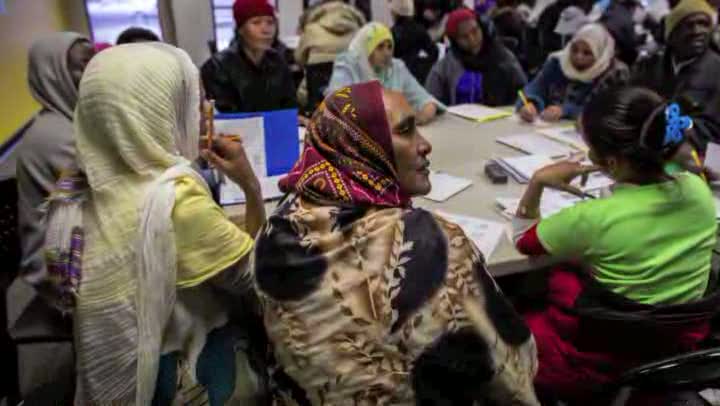- Text size
 |
|  |
|  |
| 
- Français
In rural Pennsylvania, a model of civil immigration detention
News Stories, 6 January 2011
READING, United States, January 6 (UNHCR) – There is little inside or outside the Berks County Family Shelter in rural Pennsylvania to indicate that it is a detention centre, the only one of its kind in the United States. Women gather in the halls chatting and knitting while their children attend school in the centre's classrooms. The cold weather means no one is making use of the extensive grounds or the picnic tables which overlook them.
The apparent peacefulness of the shelter stands in contrast to the turmoil many of its residents endured before arriving here. Each person's story is unique, but they all share the experience of being detained by immigration authorities while trying to enter the United States. As the only detention centre in the country for families, Berks' residents have been sent to the facility from entry points as distant as the Mexican border.
"Most of the families here are seeking asylum in the United States," said Cammilla Wamsley, acting chief of the Juvenile and Family Residential Management Unit with the Immigration and Customs Enforcement agency (ICE). "The majority of residents are able to complete the process that would allow them to be paroled to a sponsor within about 65 days, though they can stay longer if they have nowhere to go."
Maria* and two of her children were brought to Berks in September after they were caught earlier last year trying to cross from Mexico into Arizona in the southern United States. Forty-four years old, her story of abuse and exploitation goes back to her adolescence in Honduras, when she says she was raped by her stepfather.
She ran away from home only to be victimized again by a woman who said she would help, but instead forced her into prostitution. She escaped, married, had six children and endured years of physical abuse by her husband. The police, Maria claims, were unwilling to help her.
In desperation, she paid human smugglers to get her into the US and set off with her youngest children, hoping to bring the older ones once she had arrived. She fears what her husband will do to her if she is sent back and is seeking protection for her and her children.
"We were in a terrible condition when we arrived here," she said. "I'm feeling good now and my children are studying. But I'm always thinking of my other children and hoping that one day they can be with me."
Counselling services are offered to Berks' residents and for many it is the first time they have been able to talk about abuse they have suffered. Additionally, each family is assigned a case worker, employed by the County of Berks, who ensures residents' basic social services needs are met during their detention.
The Pennsylvania Immigration Resource Centre is a non-profit organization that provides a monthly legal clinic at Berks to help residents navigate the immigration and asylum systems. "If you're going to detain asylum-seekers, then Berks is the model to follow," said staff attorney Elizabeth Yaeger.
Wamsley said ICE was "committed to moving towards more civil forms of detention for all detainees," though there are no immediate plans to open additional facilities like Berks.
Many asylum-seekers in the US are held in detention centres while their cases are processed, alongside those facing immigration and criminal charges. The most recent figures from the Department of Homeland Security indicate that in fiscal year 2008 nearly 9,000 of the more than 300,000 individuals held in immigration detention centres were asylum-seekers.
"UNHCR believes strongly that the vast majority of asylum-seekers should not be detained," said Vincent Cochetel, UNHCR's regional representative for the United States and the Caribbean.
"In the rare event that it is determined an asylum seeker should be detained, then the Berks facility embodies many of the best practices for a truly civil immigration detention model," he said, adding that the small scale and non-penal environment made the facility a more suitable and humane environment for asylum-seekers – not only for families, but also for individual adults.
"We encourage ICE to make Berks the standard – not the exception – for its network of detention facilities across the country," Cochetel stressed.
*Name changed for protection reasons
By Tim Irwin in Reading, United States

















